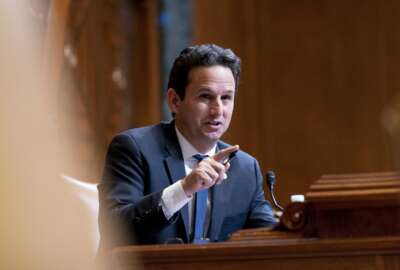New bill calls for permanent, renewed pipeline between federal unions, management
Revoked during the Trump administration, a shiny new Federal Labor-Management Partnerships Act would supercharge comity.
- A pair of Senate and House Democrats is calling for a more permanent path forward for better relationships between federal unions and management. Rep. Jamie Raskin (D-Md.) and Sen. Brian Schatz (D-Hawaii) introduced the Federal Labor-Management Partnerships Act Thursday. If enacted, the legislation would make labor-management forums a permanent staple for the federal workforce. The lawmakers said the forums can help resolve employee concerns before they escalate. The new bill comes after President Biden signed an executive order earlier this month to re-establish the forums, after they were temporarily revoked during the Trump administration. (Federal Labor-Management Partnerships Act - Rep. Jamie Raskin (D-Md.) and Sen. Brian Schatz (D-Hawaii) )
- Congress is moving ahead with plans to cut the IRS’ modernization funding. Lawmakers, as part of a spending deal for the rest of fiscal 2024, are making good on a promise to cut $20 billion of funding the IRS received in order to rebuild its workforce and upgrade its IT systems. The agency still has roughly $60 billion of multi-year modernization funds left. The Biden administration agreed to these cuts last year, as part of a deal with congressional Republicans to lift the debt ceiling and avoid a default on government debts. The spending deal also locks in the IRS’ current budget for day-to-day spending.(Congress proceeds with $20B cut to IRS modernization fund in FY 2024 spending deal - Federal News Network)
- The Senate has brought the funding hammer down on centralized IT modernization accounts in 2024. Senate appropriators cut all three accounts that help fund governmentwide IT modernization efforts. In the final set of the 2024 spending bills, lawmakers not only zeroed out the Technology Modernization Fund account for this year, but rescinded $100 million from previous years' appropriations. The Senate also reduced the allocation for the Federal Citizen Services Fund by $15 million for this year, and the Office of Management and Budget's IT Oversight and Reform Fund saw a $6 million cut. The lawmakers were not done with the ITOR fund, as they also rescinded $10 million given to the U.S. Digital Service under the American Rescue Plan Act.(Senate to take $100M back from TMF, $10M from USDS - Federal News Network)
- Congress is looking for even more details from agencies on their telework policies. The government spending agreement this week lays out six new requirements for sharing data on returning federal employees to the office. Within 90 days, the Office of Management and Budget would have to turn over all agencies’ return-to-office “action plans,” lawmakers said. Agencies would also have to report to Congress on their use of office space, and employee productivity. An OMB memo, now almost a year old, told agencies to start mandating in-person work for feds at least 50% of the time. (Congress calls for more details on federal telework in 2024 spending package - Federal News Network)
- The Defense Innovation Unit could get a major funding boost. Congressional appropriators proposed an increase of $840 million for DIU in the 2024 budget. The compromise version of the defense spending bill also requires the agency to provide Congress with details on the infrastructure, staffing and authorities the agency will need in the future. DIU was created to bring innovative and promising technologies into the Pentagon faster.(Defense Innovation Unit might get major funding increase - U.S. House Docs)
- Congressional appropriators reduced the Space Force’s procurement account from $4.7 billion to $4 billion. They also reduced the service’s research and development account from $19 billion to $18.6 billion. The bill cuts funding from the IT, data analytics and digital solutions efforts. But the Tactically Responsive Space program got a boost in the 2024 budget. The House and Senate are expected to vote on the bill today.(Congress makes cuts to Space Force’s budget - U.S. House Docs)
- The White House kicked off a new effort to change the perception that agencies don't listen to public feedback and aren't transparent in their decisions. The Office of Management and Budget released a request for information to gather input on the experiences of individuals and organizations, including from underserved communities, in how they inform federal decision-making and participate in engagement activities. OMB will use this feedback to help develop a governmentwide framework, common guidelines and leading practices for public participation and community engagement. OMB will hold listening sessions with the public over the next month as part of how it will gather responses to the RFI, which are due by May 17.(OMB developing governmentwide framework for public engagement - Federal Register)
- Americans will be waiting another six years until the next Census, but the top Democrat on the Senate Homeland Security and Governmental Affairs Committee is looking for a status update. Committee Chairman Gary Peters (D-Mich.) is asking the Government Accountability Office to review the Census Bureau’s preparations for the 2030 count in order to study potential risks, such as effectively hiring the large number of people needed to do the counting, managing IT and cybersecurity challenges, and following up with households that don’t respond. (Peters calls on GAO to conduct oversight of 2030 Census preparations - Senate Homeland Security and Governmental Affairs Committee)
Copyright © 2025 Federal News Network. All rights reserved. This website is not intended for users located within the European Economic Area.
Peter Musurlian
Peter Musurlian is a producer at Federal News Network.
Follow @PMusurlianWFED







